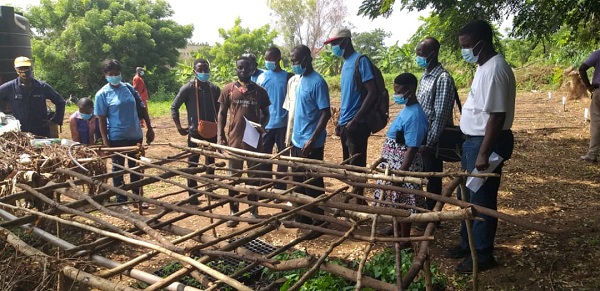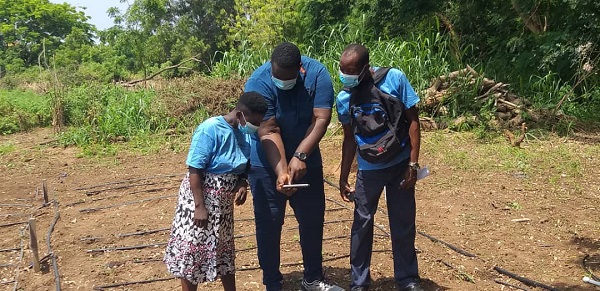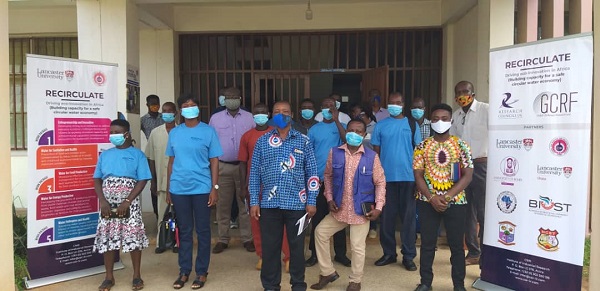
Institute of Industrial Research holds open day
The Institute of Industrial Research (IIR) of the Council for Scientific and Industrial Research (CSIR) has held an Open Day on the theme, ‘Water for Food Production’ as part of its stakeholder engagements for Work Package 3 of the RECIRCUALTE project currently underway.
The event was used as an advocacy tool and engagement strategy to raise awareness of the RECIRCULATE project and its activities in the development, transfer, and utilization of the research findings.
It was also to exchange knowledge with farmers to explore the commercial potential of irrigation scheduling, which sought to address shortfalls in water availability for crop production within the context of national development.
The RECIRCULATE programme comprises of five interlinked work-packages (WPs) that empowers partners to deliver high-quality research and innovation in Africa.

According to the IIR, the core objectives of ‘Water for Food Production’ which is Work Package 3 under the RECIRCULATE project are to identify what approaches to water efficient irrigation are most appropriate for the cultivation of fresh produce, given the water resource available. It is also to investigate how efficient techniques can be developed and optimized for farmer communities which will require an understanding of the socio-economic barriers to the adoption of water-saving irrigation techniques in selected communities.
The open day was in two parts, split into an open session and a field trip to the project site where experimental field trials on various irrigation scheduling techniques are conducted to compare the growth, yield and water productivity response of tomato plants subjected to thermal imaging (plant sensing) Penman-Monteith (meteorology), tensiometer (soil sensing) and grower intuition methods of irrigation scheduling.
In his welcome address to the Institute and event, Mr. Joseph Yaw Amoah, Deputy Director, CSIR-IIR who chaired the occasion welcomed farmers from the three selected communities in the Central Region of Ghana namely Gomoa Okyereko, Baifikrom and Mankesim as well as other key stakeholders in the Agri Food Chain.
He re-emphasised CSIR’s commitment to solving problems through research to facilitate national development.
Mr. Amoah gave a brief overview of the Open Day and underscored why it is important for the Institute to open its doors to the general public.
He further explained that, it is important for stakeholders to know more about CSIR so they tap into CSIR’s expertise.
He also acknowledged organisations which collaborated with the Institute, as well as those who helped the Institute to get data to enrich its field research.

Dr. William Owusu Oduro, CSIR-IIR who is the coordinator for the Work Package 3 of the RECIRCULATE project, shed more light on the project with special emphasis of the various Work Packages and their relevance to human sustenance and development. He said the project sought to help minimize waste and to maximize the benefits derived from natural resources and the environment as a whole.
The second session which lasted for almost two hours focused on the technical activities, knowledge sharing and interactions where scientific research findings met local knowledge and experience.
The session was led by Mr. Gilbert Osei, a versatile researcher with interest in deficit irrigation, drip irrigation, pitcher irrigation and irrigation water quality and currently a doctoral fellow at the Department of Agricultural Engineering, University of Cape Coast, Ghana pursuing a PhD in Irrigation technology and Management.
In his closing remarks, the chairman said, “It is about time Ghanaians tap into the technologies and research findings from research communities like the CSIR”, saying it would be an impetus for national development.
He urged participants to remain committed to the knowledge impacted in order to be successful in their various endeavours.
Mr. Amoah acknowledged there were challenges within the agribusiness sector especially with access to funding opportunities and patronizing research outputs and technologies. He however advised farmers and other participants to form business networks and take advantage of government flagship initiatives like the One District One Factory (1D1F) and the Planting for Food and Jobs, saying these have the ability to improve their lot.
Click to read more ABOUT THE RECIRCULATE PROJECT